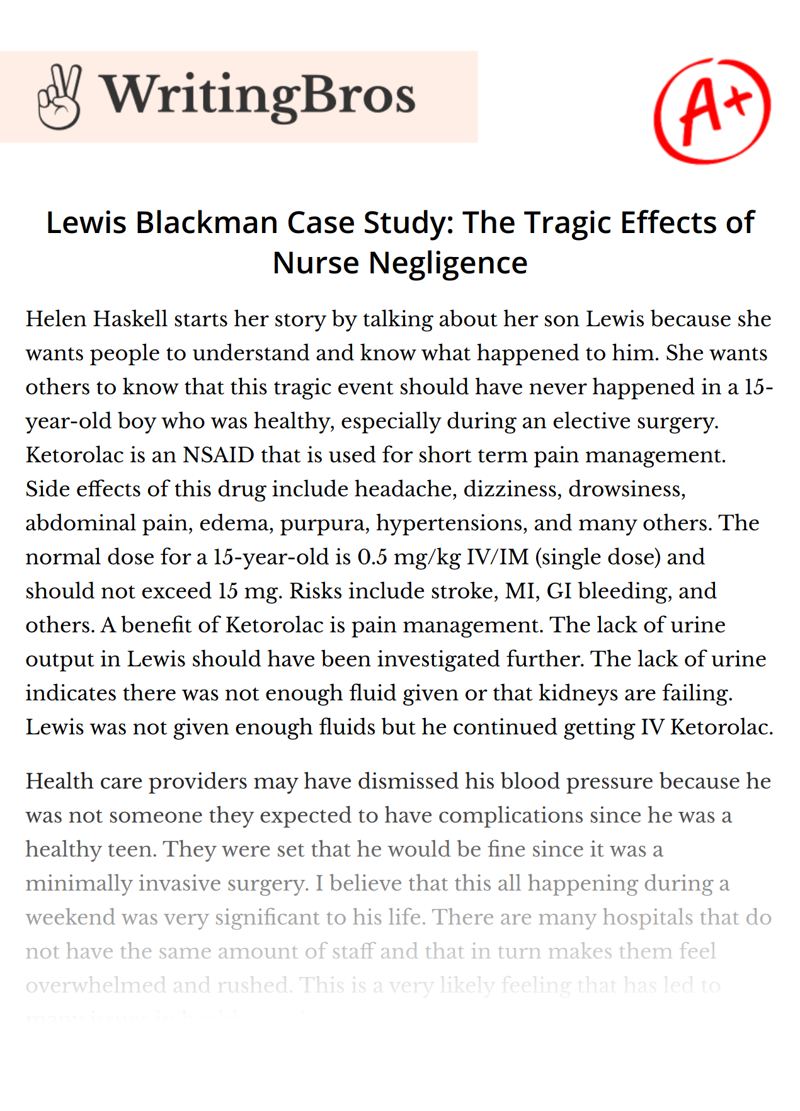Lewis Blackman Case Study: The Tragic Effects of Nurse Negligence

Helen Haskell starts her story by talking about her son Lewis because she wants people to understand and know what happened to him. She wants others to know that this tragic event should have never happened in a 15-year-old boy who was healthy, especially during an elective surgery. Ketorolac is an NSAID that is used for short term pain management. Side effects of this drug include headache, dizziness, drowsiness, abdominal pain, edema, purpura, hypertensions, and many others. The normal dose for a 15-year-old is 0.5 mg/kg IV/IM (single dose) and should not exceed 15 mg. Risks include stroke, MI, GI bleeding, and others. A benefit of Ketorolac is pain management. The lack of urine output in Lewis should have been investigated further. The lack of urine indicates there was not enough fluid given or that kidneys are failing. Lewis was not given enough fluids but he continued getting IV Ketorolac.
Health care providers may have dismissed his blood pressure because he was not someone they expected to have complications since he was a healthy teen. They were set that he would be fine since it was a minimally invasive surgery. I believe that this all happening during a weekend was very significant to his life. There are many hospitals that do not have the same amount of staff and that in turn makes them feel overwhelmed and rushed. This is a very likely feeling that has led to many issues in health care because people are less focused and are more likely to overcome things. Septic shock is an inflammation that acts quickly. Signs of sepsis may include; confusion, SOB, high/increased heart rate, clammy skin, extreme pain and fever, shivering, or feeling extremely cold. A doctor needs to be notified right away when sepsis is suspected. Antibiotics should be started right away and the patient monitored very closely. Helen Haskell describes a “good” nurse or physician by being one who has empathy, is a patient advocate, empowered and courageous, encouraging, oriented behavior, having the training needed for emergency situations, have critical thinking skills, and knowledge. Patients and nurses need to have an open line of communication. Patients need to ask questions about their care and be comfortable doing so, while nurses need to provide information to them and their families as well as establishing trust by doing so. When Helen says “misplaced professionalism” I think she means nurses not listening to the patients or believing them or their families. Some nurses may think that they know the patient better than anyone else. Listening is the best way to help prevent further complications because if the patient or family is concerned there may be a real and valid reason for it even if it is harmless.
I think we have all heard about nurses dismissing family/patient concerns, however from my experience I typically see nurses taking them very seriously and try to get a better understanding of the issue and why they feel it is a concern and try to find a solution to those concerns. Professionalism in my opinion is a combination of many traits. Being dependable, having knowledge and willingness to learn new things, honesty and advocating for patients are the biggest traits I would attribute to professionalism. Policy-level will help nurses to feel more empowered. The Lewis Blackman Law, having to give the patients the physicians phone number, will help patients and family feel more empowered knowing that they have resources and knowing how to obtain those resources. This also alleviates some of the families and patients stress in the difficult times knowing how to use them. In this hospital it seemed there was no communication between the hospital’s staff and the actual family. The staff disregarded the family’s concerns about their son and it had a fatal effect. I think that if families were considered part of the health care team more that many complications could be prevented or quickly reversed. However, with sepsis unless it is caught very quickly it is often fatal. However, the family may not hold so much pain and resentment towards the health care team if they had taken the correct steps and listened to the family. I would agree that there was little evidence of teamwork in this hospital based on Haskell’s recollection. There was no or very little communication between staff and the family. Had there been communication the staff would have been able to react quickly and potentially would have been able to save the patients life. I have no worked in a hospital but during my clinicals so far, I have found that it is all about the staff and their goals.
The staff I have worked around have been amazing in focusing on what the patients tell them and they try to solve their problems and listen to their concerns. Listening is a huge part of health care and many outcomes can be based on if the staff listens or choose not to. Health care professionals can support teamwork and patient-centered care by listening to their patients, being willing and able to communicate effectively with the other staff and families/patients. They need to be able to ask for help from other staff members if they suspect something is wrong or does not quite add up to ensure the best outcomes for patients. Asking questions is not something that should be looked down upon in health care as teamwork is always better than one mind and risking making a mistake if someone is unsure. They need to be able to consider and be able to build upon concerns in a supportive way to families.
Cite this Essay
To export a reference to this article please select a referencing style below

